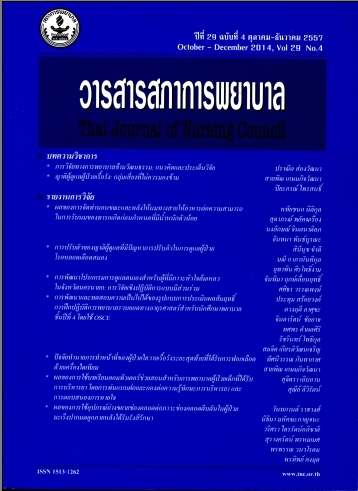การปรับตัวของญาติผู้ดูแลที่มีปัญหาการปรับตัวในการดูแลผู้ป่วยโรคหลอดเลือดสมอง
Keywords:
การปรับตัว ญาติผู้ดูแลที่มีปัญหาการปรับตัว การดูแลผู้ป่วยโรคหลอดเลือดสมอง, family caregiver, chronic patient, health problem risk groupAbstract
บทคัดย่อ: วัตถุประสงค์ของการวิจัย: เพื่อศึกษาการปรับตัวของญาติผู้ดูแลที่มีปัญหาการปรับตัวในการดูแลผู้ป่วยโรคหลอดเลือดสมอง
การออกแบบงานวิจัย: การวิจัยเชิงคุณภาพ
การดำเนินการวิจัย: ญาติผู้ดูแลผู้ป่วยโรคหลอดเลือดสมอง จำนวน 10 ราย ได้รับการคัดเลือกแบบเฉพาะเจาะจงตามเกณฑ์ที่กำหนด และเต็มใจเข้าร่วมการศึกษานี้ เก็บรวบรวมข้อมูลโดยการตอบแบบสอบถามข้อมูลส่วนบุคคล และการสัมภาษณ์เชิงลึก 2 ครั้ง ร่วมกับบันทึกเทป และบันทึกภาคสนาม ได้ถอดเทปข้อมูลและวิเคราะห์ข้อมูลโดยใช้การวิเคราะห์เชิงเนื้อหา
ผลการวิจัย: พบว่า การปรับตัวของญาติผู้ดูแลที่มีปัญหาการปรับตัวในการดูแลผู้ป่วยโรคหลอดเลือดสมอง ประกอบด้วย 6 ประเด็นหลัก ได้แก่ การจำใจยอมรับ การระบายอารมณ์ การหนีปัญหา การไม่พึ่งพาผู้อื่น การพยายามจัดการกับบทบาทที่เปลี่ยนไป และการปรับเปลี่ยนของร่างกาย
ข้อเสนอแนะ: พยาบาลควรเข้าใจและตระหนักถึงปัญหาการปรับตัวของญาติผู้ดูแลแต่ละรายที่มีบริบทแตกต่างกันในการดูแลผู้ป่วยโรคหลอดเลือดสมอง ข้อมูลเหล่านี้สามารถนำไปใช้ในการวางแผนการดูแลและเตรียมญาติผู้ดูแลก่อนจำหน่ายผู้ป่วยออกจากโรงพยาบาล และที่สำคัญพยาบาลควรมีการติดตามญาติผู้ดูแลอย่างสม่ำเสมอเพื่อประเมินการปรับตัวของญาติผู้ดูแล รวมทั้งให้คำแนะนำและความช่วยเหลือแก่ญาติผู้ดูแลได้อย่างเหมาะสม
Abstract
Relatives taking care of chronic patients at home are prone to suffer from its negative physical, psycho-emotional and social effects, which could lead to chronic stress and deteriorating health. In particular, elderly and unwell family caregivers who are the patients’ spouses form a risk group that must not be overlooked. However, the present health-service system places primary emphasis on preparation of relatives to be family caregivers, but not on the caregivers’ state of wellbeing. This article, presenting an analysis of relevant research studies, attempts to describe (i) negative effects encountered by family caregivers, (ii) the need for holistic and comprehensive preparation of family caregivers to ensure that they receive uninterrupted attention and assistance from the time of the patients’ hospitalisation to the time of their discharge and return to their homes, and (iii) the continuity of caregiver-patient assistance coordination, in order to enhance the family caregivers’ efficiency in taking care of both the chronic patients and their own health, and improving the patients’ life quality in the process.







